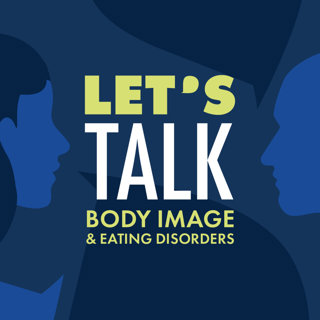
In Depth with men's body image expert Scott Griffiths
Dr Scott Griffiths is one of Australia’s top researchers in body image and eating disorders and a National Health and Medical Research Council Fellow at the University of Melbourne. He’s currently involved in an ongoing study into the male experience of eating disorders.In this In Depth episode, he challenges the myth that men are not impacted by either body image issues or eating disorders. While people usually think that only young, privileged, white women experience eating disorders, the truth is that 30% identify as male. Dr Griffiths thinks this percentage may be much higher because men are reluctant to speak up or seek help. Still, there are intense social pressures on men to look a certain way, and this puts them at risk.“If we assume that the eating disorders we see and know about are all that are out there, then men are a minority of diagnoses”, he says. “But it wouldn’t surprise me if there are many more men affected. We just don't see them because we don’t know how to find them.”Find out how Dr Griffiths managed to reach men for his research work, and what Butterfly is also doing to provide education, information, and much-needed support.Find out more about Dr Scott Griffiths.To find more resources for men check out Butterfly's males, eating disorders and body image page or RESET, a conversation about boys' body image.See omnystudio.com/listener for privacy information.
16 Nov 202118min

Eating disorders and other health conditions
We know that treating an eating disorder can be complicated. But when you’re managing an eating disorder along with a co-occurring medical condition, that can add extra complexity.It’s quite common for eating disorders to co-exist with other health issues but it's often unclear whether eating behaviours are to appropriately mitigate symptoms or are a disordered response to distress. In this episode, we talk to guests living with coexisting conditions. Host Sam Ikin also talks to experts who help their clients to manage both.Psychologist Dr Angelique Ralph says it’s sometimes difficult to know if you adjusted the way you eat to treat a chronic health issue or if it is an eating disorder. “Is the health condition impacting the eating disorder, the eating disorder impacting the health condition, or are they both reinforcing each other?”For Lizzie, the eating disorder came first but she was managing it until she was diagnosed with coeliac disease. “My eating disorder flared. And I realised I was using my diagnosis as a reason not to eat.”Sienna has had a long history of diabetes coupled with an eating disorder to create a condition called diabulimia. “If you don't take your insulin, your body eats itself,” she says. “It attacks all of your organs. It eats your fat first, then everything that you put into your body is pretty much burned up.”Dietitian Shannon McDonough works primarily with people diagnosed with diabetes. "Around 35% of those living with diabetes also experience disordered eating or are actually living with an eating disorder." she says, "It's quite staggering really."Ange lives with endometriosis and has also experienced an eating disorder. “There was a mix of me self-medicating when I wasn't seeing a professional, and professionals actually giving me these diets,” she says. “I became addicted to this cycle of restriction.”As we listen to each guest’s perspective, we also find out what model of treatment can help.See omnystudio.com/listener for privacy information.
2 Nov 202126min

Professor Richard Newton: Let's Talk In Depth
Psychiatrist Richard Newton is an adjunct professor at Monash University, the clinical director of a large mental health service (that also serves as a teaching hospital), and serves on the boards of Butterfly and Wandi Nerida, Butterfly’s residential treatment centre on the Sunshine Coast.In this episode, he talks with Sam Ikin about how mental health conditions, including eating disorders, often co-occur. “One of the challenges of treating someone with an eating disorder is identifying the co-morbid mental health issues that we need to treat too.”The problem is, when eating disorders are present, it can be challenging to figure out what else is at play. This is because some mental health issues are effectively mitigated or reduced by the eating disorder.The good news is that a new understanding of mental health about eating disorders is helping to improve diagnosis and care.See omnystudio.com/listener for privacy information.
18 Okt 202122min

What is healthy eating?
We live in a world where we’re constantly marketed cheap, addictive “food” with very little nutritional value, and we’ve all heard about the public health impacts of that.It’s a situation that’s led to a growing distrust of the food system and increased fear of food. It’s little wonder there’s rapidly growing interest in “healthy eating”, and it’s why the diet industry has begun to systematically rebrand itself to be more about health and “wellness”. But the industry is still fundamentally a weight loss industry, with a clear focus on restricting food intake.In this episode, we ask the question, “what is healthy eating”? Dietitian Elizabeth Stathakis says a healthy diet is diverse and depends on your budget, your geography, your cultural preferences, and your medical history. There’s not one healthy diet that fits for us all.Psychologist Janet Lowndes warns that when we classify foods as good or bad and get into restriction, that restriction can gain momentum. There is a real risk of developing an eating disorder.We also talk to three people who have a lived experience of how their healthy eating did indeed develop into an eating disorder. Now that they’re in recovery, they describe how their idea of healthy eating has evolved to be much healthier for both their bodies and minds.See omnystudio.com/listener for privacy information.
5 Okt 202127min

Social media investigator Suku Sukunesan, Let's Talk in Depth
Social media is a huge driver of body image issues and young people are particularly at risk. Packed with unrealistic images and ideals, social platforms can be an incubator for mental illness – including eating disorders. But the problem is worse than most people think according to Swinburne University researcher in applied social technology Dr Suku Sukunesan.Dr Sukunesan's research has been making waves in the Australian media lately as more people begin to pay attention to his disturbing findings of the destructive impact social media can have. He told host Sam Ikin that young people vulnerable to eating disorders were particularly at risk on social platforms where a dark, hidden network operates right beneath our noses.For some helpful tips on how to help young people use social media safely, Butterfly has a helpful guide for parents Parents https://butterfly.org.au/wp-content/uploads/2021/02/Instagram-Parents-Guide.pdfOr the Body Kind Families media resilience fact sheet - https://butterfly.org.au/wp-content/uploads/2021/08/BK_Families_Resilience-to-Media-Tips_FINAL.pdfSee omnystudio.com/listener for privacy information.
20 Sep 202117min

Teens and body image: Starting at home
With so many developmental and even physical changes happening in their lives, teenagers are particularly vulnerable to body image issues. Spurred on by social media, they’re constantly comparing themselves to others.Having a positive body image can help teens to develop self-esteem, self-confidence, and to develop socially. It can lead to better mental and physical health later in life.The problem is research shows that, consistently, body image is one of teens’ top three concerns. Also, the number of adolescents reporting body dissatisfaction is increasing, exposing more and more youngsters to long term effects.Dr Justin Coulson, one of Australia’s top parenting experts says a healthy body image starts at home. “The last thing we should be doing is shaming bodies,” he says. “When a child feels disconnected, shamed and unworthy, they're less likely to take the input of their parents.”Clinical Psychologist Dr Louise Adams agrees: “Body image is about much more than our bodies,” she says, “It’s actually how we feel about ourselves, based on our physical appearance, and how our physical appearance has been treated in the world.”In this episode, we look at how the home environment can have a significant influence on a teen’s body image. For example, positive role-modelling and demonstrated kindness toward our bodies and others’ can act as a protective factor to other influences our teens can’t control.We also hear from Jem and their dad, Richard, and Ashlee and her mom, Christine – Jem and Ashlee have both battled debilitating body image issues, but their families have learned to review body image in ways that are helping to see them through.To find out more about Justin Coulson’s work go to https://www.justincoulson.com/To hear more from Louise Adams go to https://untrapped.com.au/And for more on Butterfly’s Body Kind Families program, visit www.butterfly.org.au/bodykindfamiliesSee omnystudio.com/listener for privacy information.
6 Sep 202126min

Paralympian Jessica Smith, Let's Talk in-Depth
Mental health was one of the major underlying issues laid bare at the Tokyo Paralympics. While we all heard about high profile athletes and their struggles from a distance, Australian Swimmer Jessica Smith has lived through it. As a kid living with a disability, Jessica wanted to win gold for her country since she realised she could beat all the able-bodied swimmers at her school. It became more than a dream. Swimming was her life's work and her identity. In 2004 Jessica's went to the Athens Games as a favourite, only to have her Olympic Dreams shattered when her health, both mental and physical, failed her. She was suffering from anxiety, depression and a severe eating disorder that was affecting her physical health and her performance in the pool. Eventually, she realised that she couldn't control these co-occurring disorders and continue in her high-performance sporting career. She had to choose between her health and Olympic glory.Jessica opens up about her struggles in this episode of Butterfly's Let's Talk In-Depth with host Sam Ikin.See omnystudio.com/listener for privacy information.
23 Aug 202122min

Dealing with difficulties accessing care
It can take a lot of courage for someone living with an eating disorder to admit they need help. But all too often those who struggle are held back by a complex health system, a shortage of trained clinicians, GPs who don’t pick up on the warning signs, and the high cost of treatment. That’s over and above the ever-present myths that surround eating disorders.Imogen tells us how she couldn't find the right specialists through the public health system until she became medically unstable enough to be hospitalised. Alex describes how his daughter's recovery and access to support was impacted by lockdowns in both Melbourne and Sydney. And Jeanette shares her story of dealing with medical professionals who had little experience with eating disorders. She had to travel hundreds of kilometres to get appropriate care.Dr Kim Hurst, President of the Australia and New Zealand Academy for Eating Disorders (ANZAED) confirms that the system has been difficult for people with lived experience, mostly because of the shortage of trained clinicians. Dr. Gemma Sharp, the creator of Butterfly’s chatbot KIT, agrees. She advocates that all health professionals should receive at least basic training about eating disorders, regardless of what profession they’re in.The good news is that Kim and Gemma are amongst many dedicated people who are developing programs to address the situation. In this podcast, you’ll hear about some of these, along with all our guests’ thoughts about how, in the interim, we can deal with the difficulty of accessing care.See omnystudio.com/listener for privacy information.
2 Aug 202125min





















